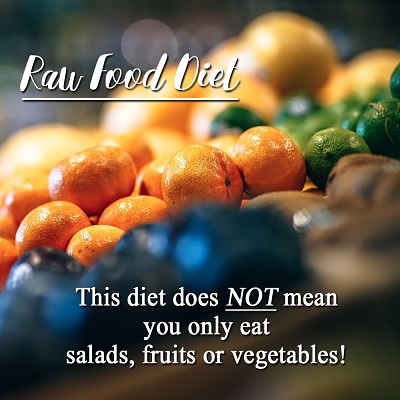 Raw food is defined as foods that have not been refined, canned, pasteurized, treated with pesticides, heated past 48C or processed in any way. This diet can be readily adapted to vegetarianism or even veganism, as it is predominantly a plant-based diet, with fruits, vegetables, seeds and nuts being the primary food groups.
Raw food is defined as foods that have not been refined, canned, pasteurized, treated with pesticides, heated past 48C or processed in any way. This diet can be readily adapted to vegetarianism or even veganism, as it is predominantly a plant-based diet, with fruits, vegetables, seeds and nuts being the primary food groups.
However, in its most liberal form the raw-food diet allows meat consumption, providing it has not been heated above the allowed limit.
As the diet requires all food to be raw and uncooked there are plenty of other ways to prepare the foods such as blending, dehydrating, soaking, juicing and sprouting.
This diet does not mean you need to just eat salads or plain vegetables as you can be as creative as you like with the foods within the raw range. There are plenty of ways to eat raw foods from cakes and slices to fruit salads and fresh vegetable juices so there should be many ways to incorporate raw food into your lifestyle.
To follow the raw food diet correctly the goal is to make sure that at least 75% of the foods you consume are raw. Grains and legumes are permitted in most raw food diets, and are usually sprouted or soaked before consumption.
Nutrients and Enzymes
Most fresh foods contain natural enzymes that the body uses to perform its needed functions when consumed and these enzymes can be destroyed if food is heated or cooked.
Some foods start to lose their nutrient value, generally past 58C, as these nutrients are heat sensitive. Vitamin C, folate (B9), thiamine (B1), pyridoxine (B6) and pantothenic acid (B5) are the most heat sensitive nutrients lost by over-heating, boiling or cooking fresh foods.
Protein
Getting enough protein on the raw food diet can be the largest struggle to achieve for those who avoid meat options. Seeds, nuts and leafy greens are the best protein-filled raw alternatives when participating in this diet meat-free.
Raw Foods Allowed
Some of the foods that are allowed in the raw food diet are:
- All fresh fruits and vegetables (organic)
- Dried meats
- Dried fruits and vegetables
- Fermented foods (i.e. kimchi)
- Raw eggs or dairy
- Nut milks (fresh)
- Raw nut butters
- Cold-pressed olive and coconut oil
- Raw nuts and seeds
- Seaweed and raw fish
- Raw meats (if desired)
Raw Foods to Avoid
Foods that are strictly prohibited in the raw food diet are cooked, processed or refined foods. Some of these include:
- All cooked foods
- Baked items
- Table salt
- Refined sugars
- Pasteurized dairy
- Bottled juices
- Alcohol
- Pasta
Benefits to Following the Raw Food Diet
The raw food diet has been shown to have plenty of health benefits to those who follow it correctly. Some of the benefits include weight loss, increased energy levels, improvement of chronic health diseases and also a reduced impact on the environment for not using excess packaging.
For weight loss this diet is perfect as it only has a small amount of calories due to its high intake of plant based foods, and these calories are not derived from simple carbohydrates. Care must be taken to make sure you don’t let your body weight get too low, as this can cause unwanted health complications for both men and women.
This diet is considered to be safe for the short term although long term effects can vary from person to person. It is important that if you have a previous diagnosis of any serious illnesses or health concerns you should consult with your healthcare professional and nutritionist to see if the diet is right for you.






